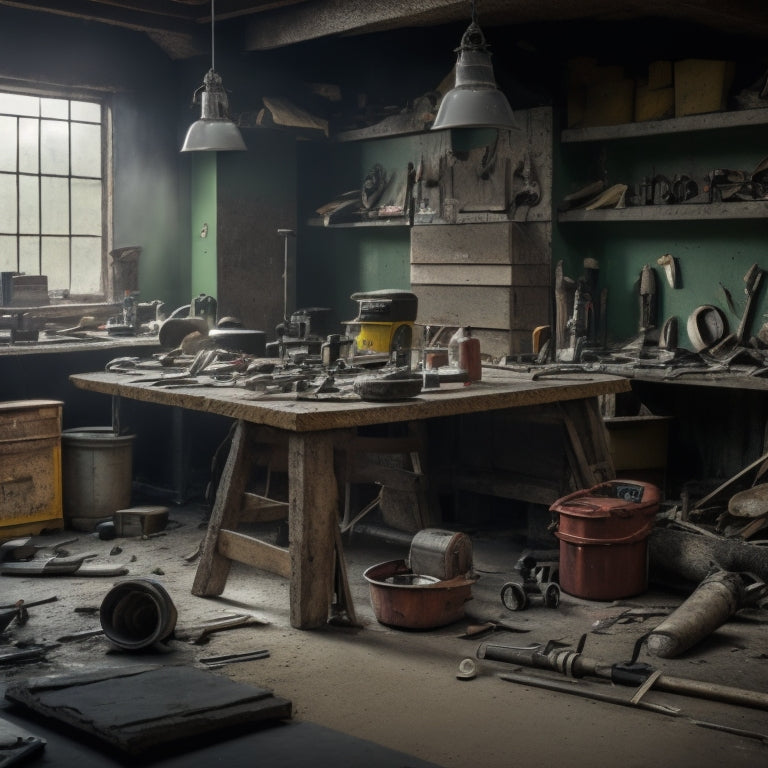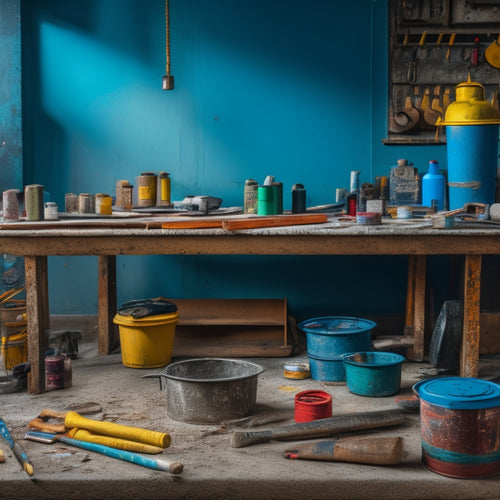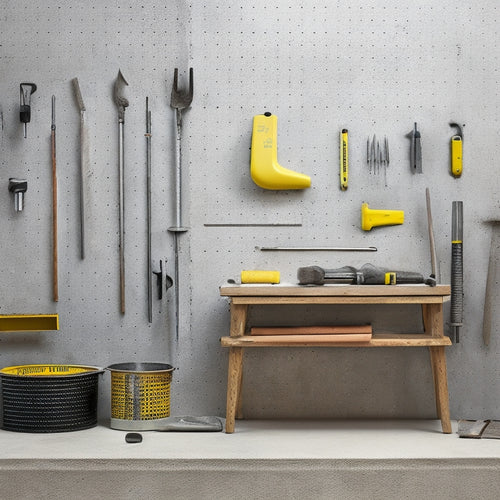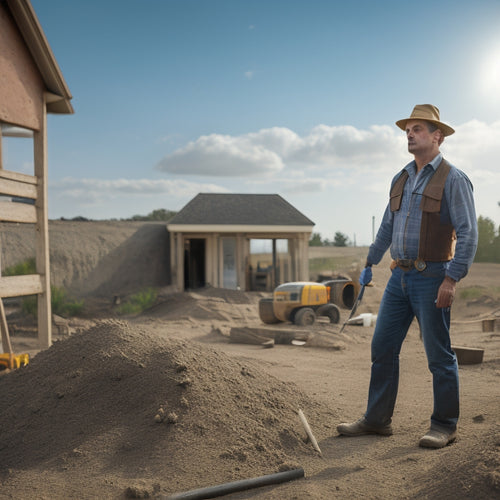
Why Anchor Your Tools to Concrete Walls
Share
By anchoring your tools to concrete walls, you're taking a proactive step in safeguarding your valuable equipment investments, preventing costly theft and loss, and streamlining your workshop's organization and safety. This strategic move also enables you to optimize storage space efficiency, reduce clutter and damage risks, and promote a more enjoyable working environment. By securing your tools, you're not only protecting your bottom line but also paving the way for increased productivity and better project outcomes. As you explore the benefits of anchoring your tools, you'll discover even more ways to elevate your workshop's performance.
Key Takeaways
- Anchoring tools to concrete walls prevents theft and loss, reducing costly delays and workflow disruptions.
- It enhances tool management strategy, improving inventory tracking and maintenance.
- Anchoring tools reduces tripping hazards, promoting overall safety and a more organized workshop environment.
- It prolongs the lifespan of tools, minimizing repair and replacement costs.
- Anchoring tools maximizes storage space efficiency, leading to increased productivity and better project outcomes.
Preventing Tool Theft and Loss
Theft and loss of tools can be a significant setback for any project, causing costly delays and disrupting workflow. You understand the importance of tool security and theft prevention to guarantee your project stays on track.
Implementing anchor systems can be an essential step in your tool management strategy. By anchoring your tools to concrete walls, you're taking a proactive approach to preventing theft and loss. This concrete benefit translates to increased equipment longevity, as your tools are less likely to be damaged or stolen.
Additionally, anchor systems provide a secure and organized way to store your tools, making it easier to track and maintain your inventory. By prioritizing tool security, you're investing in the success of your project and reducing the risk of costly setbacks.
Protecting Valuable Equipment Investments
Anchor systems safeguard your valuable equipment investments by securing them to concrete walls, shielding them from would-be thieves and accidental damage.
By anchoring your tools, you guarantee their prolonged lifespan, which is critical for your operations. Equipment longevity is directly tied to your investment protection.
When you anchor your tools, you prevent damage from accidental knocks, drops, or other forms of mishandling. This means you'll spend less on repairs and replacement, thereby preserving the value of your equipment investments.
Furthermore, anchored tools are less prone to wear and tear, allowing you to extract the maximum return on investment from your equipment.
Ensuring Workshop Organization and Safety
Secure your tools to concrete walls and instantly transform your workshop into a haven of organization and safety. By doing so, you'll create a space that's not only visually appealing but also functional and efficient.
| Tool Accessibility | Workspace Aesthetics | Safety Benefits |
|---|---|---|
| Easy access to frequently used tools | Clutter-free work surfaces | Reduced tripping hazards |
| Reduced tool misplacement | Improved lighting and visibility | Minimized risk of tool-related accidents |
| Streamlined workflow | Enhanced overall workshop ambiance | Increased confidence and peace of mind |
When you anchor your tools to concrete walls, you're creating an environment that promotes tool accessibility, workspace aesthetics, and safety. You'll be able to quickly locate and access the tools you need, which will streamline your workflow and increase productivity. Additionally, a well-organized workspace will improve the overall ambiance of your workshop, making it a more enjoyable space to work in. By securing your tools, you'll also minimize the risk of accidents and create a safer working environment.
Reducing Clutter and Damage Risks
By clearing clutter from your workshop floor, you're not only eliminating tripping hazards but also protecting your tools and equipment from damage.
When your workspace is clutter-free, you can move around more efficiently, reducing the risk of accidents and damage to your tools.
Furthermore, you'll spend less time searching for misplaced tools, increasing your productivity and workflow.
Maximizing Storage Space Efficiency
Every square foot of your workshop counts, and maximizing storage space efficiency is essential to maintaining a productive and organized workspace.
Frequently Asked Questions
Can I Anchor Tools to Walls With Different Types of Concrete?
You can anchor tools to walls with different types of concrete, but make certain you choose the right anchor for ideal tool stability, as varying concrete types, such as lightweight or high-strength, require specific anchor designs.
How Deep Should Anchors Be Drilled Into the Concrete Wall?
When drilling anchors into concrete walls, you'll need to take into account anchor depth, which depends on concrete density. For standard concrete, aim for 1-2 inches of anchor embedment, but for high-density concrete, you may need to drill up to 3 inches for best hold.
Are There Specific Anchors for Different Tool Weights and Sizes?
You'll be shocked to learn that there are hundreds of anchor types tailored to specific tool weights, from lightweight screw anchors for 10-pound drills to heavy-duty epoxy anchors for 500-pound industrial machinery - choose wisely to guarantee a secure hold!
Can I Use Adhesive Strips Instead of Drilling Into the Wall?
You can use adhesive strips, but consider the wall surface and adhesive type; for instance, epoxy-based adhesives work well on rough concrete, while acrylic-based ones suit smooth surfaces, ensuring a secure hold for your tools.
Do I Need to Anchor All Tools or Just the Heavy Ones?
When organizing your tools, you don't need to anchor every single one, but you should secure the heavy ones to guarantee tool safety; for lighter tools, consider using adhesive strips for easy organization tips and efficient storage.
Conclusion
By anchoring your tools to concrete walls, you're not only protecting your valuable investments but also ensuring a safer, more organized workshop. According to the National Insurance Crime Bureau, one in five small businesses falls victim to equipment theft, resulting in an average loss of $10,000. Don't become a statistic - secure your tools and reap the benefits of a clutter-free, efficient workspace.
Related Posts
-

Essential Tools for Painting Concrete Walls
When painting concrete walls, you'll need a range of specialized tools to achieve a professional-looking finish. Star...
-

10 Must-Have Tools for Concrete Repair Organization
You'll need a solid organization system to keep your concrete repair tools and materials within easy reach, protected...
-

Concrete Foundation Building Tools for Homeowners' Success
As you start your concrete foundation building project, it is vital to have the right tools to guarantee success. You...


